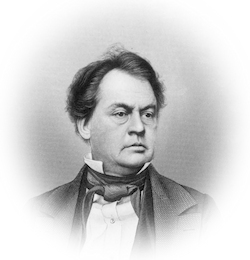Washington, D. C, May 7th, 1860.
Dear Stephens, The late events in Charleston have created a great sensation here. The result of general consultation among the Southern Senators seems to be this—that admitting the propriety of the secession when it was done, that Virginia, Kentucky and Tennessee having preferred an ultimatum which was sustained by N. York and can be carried by those votes in connection with those of the seceding states, that the seceders shall return to Balto., unite with Virginia and Tenneessee and Kentucky in the ultimatum, upon the agreement beforehand that all will secede together if the ultimatum be rejected. I think this programme will be adopted this morning at a meeting of the Senators and Reps, of the seceding states, and will be offered by the Tennessee platform states, upon which a joint address will be made to the South.
I am sorry to see an effort making in Georgia to call a new convention, doubtless simply to send delegates for Douglas. The present [del]egation would be sustained unless condemned by the convention which sent them to Charleston, which it would be much better to recall than to get up a new one under the notice I see given in Augusta. A bogus delegation would only complete the demoralization and ruin of the party in Georgia, and would certainly be fatal to Douglas even if he should carry the nomination at Charleston. I see but little hope for a favourable issue of the business. The rancor existing between the Douglas and anti-Douglas factions has swallowed all sense of public danger or public principle. For myself I shall approve the above described programme and let it go. I do not think any considerable portion of those who professed to be for Hunter were really for him but were all the time looking to other results. Douglas has pressed his name upon us until I shall accept it and resist him to the bitter end, tho’ I see nothing but disaster and defeat in the future. The true policy would be for him to withdraw. That I am now satisfied he never intended to do in any event whatever. Pennsylvania was really for the platform of the [So.?] States. So was New Jersey, but Wright violated his instructions. I am sick of the very contemplation of such a lot of rogues as those Northern delegates proved themselves to be, and I now see that the contest is to be transferred to the South, which is the greatest calamity that could befall us. We are all in good health. Nothing else new or talked of but the late events in Charleston.
From Annual Report of the American Historical Association for the Year 1911.
Robert Augustus Toombs was an American lawyer, planter, and politician from Georgia who became one of the organizers of the Confederacy and served as its first Secretary of State. He served in the Georgia House of Representatives, the US house of Representatives, and the US Senate. In the Confederacy, he served in Jefferson Davis’ cabinet as well as in the Confederate States Army, but later became one of Davis’ critics.
Alexander Hamilton Stephens was an American politician who served as the vice president of the Confederate States from 1861 to 1865. After serving in both houses of the Georgia General Assembly, he won election to Congress, taking his seat in 1843. After the Civil War, he returned to Congress in 1873, serving to 1882 when he was elected as the 50th Governor of Georgia, serving there from late 1882 until his death in 1883.
